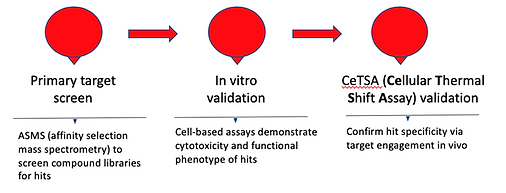
TarMeta Biosciences: Combining Target With Phenotypic-Based Drug Discovery
TarMeta Biosciences, Inc. is a Boston based early stage drug discovery company with deep expertise in analytical chemistry whose mission is to identify and commercialize novel small molecule therapeutics for difficult to treat cancers.
TarMeta’s drug discovery platform offers an approach to the drug discovery process that focuses on efficient and cost-effective pre-clinical drug development. By combining elements of both target and phenotypic based drug discovery as well as thermal shift assay, TarMeta’s platform allows for investigation of a molecule’s effects in a more physiologic environment and provides important information about the complex biological mechanisms that may be impacted upon treatment.
Improving R&D productivity is among the greatest issues faced by the pharmaceutical industry. The ability to reduce the attrition rate of drug candidates in clinical development not only presents the greatest challenge in the pharmaceutical industry but also the greatest opportunity. Given the extremely high costs of clinical development, an efficient and economical strategy for drug discovery would involve a process that has the ability to reduce late stage development failures. In addition, any cost-effective approach that could predict toxicological liability or undesirable pharmacokinetc properties pre-clinically will also reduce downstream attrition.
Brief Description of Target Based Drug Discovery
In target based drug discovery, the goal is to identify molecules that interact with a specific drug target known to be involved in a disease process. This is typically done with high throughput screening (HTS) which allows for the automated screening of large compound libraries to determine if any molecules in the library bind the target of interest.
This “hit” molecule then undergoes modification through medicinal chemistry which requires extensive time and resources in an effort to optimize the potency, selectivity, and solubility properties of the compound.
A significant limitation of target based approaches is that certain chemical properties critical to the development of a new drug can’t be assessed by compound library screening. For instance, HTS cannot evaluate cytotoxicity and solubility.
Brief Description of Phenotypic Based Drug Discovery
This is a more direct translational model of disease pathophysiology and is used to identify molecules that have the ability to alter a cell’s phenotype in a pre-specified manner, such as cell death.
In contrast to target-based drug discovery, phenotypic screening does not rely on knowing the identity of the specific drug target or its hypothetical role in the disease. This method allows for investigation of a molecule’s effects in a more physiologic environment and provides important information about the complex biological mechanisms that may be impacted upon treatment, thus allowing for elucidation of a drug’s mechanism of action.
Increasing the understanding of cell signaling pathways affected by a drug could potentially decrease the amount of clinical failures by identifying factors contributing to unexpected activity, toxicities and lack of efficacy.
While offering a robust methodology for identification of novel targets in a physiologic environment, the target deconvolution process is considered to be a major limitation in the phenotypic based approach.
Combined Approach for
TarMeta’s novel proprietary platform is able to generate high-quality drug candidates which are validated against known therapeutic targets of high clinical and commercial interest, while offering potential for a significant return on R&D investments via improved R&D productivity.
The TarMeta Drug Discovery Platform combines a target and phenotypic based approach to the drug discovery process which offers distinct advantages to either method alone by providing information about the physiochemical properties of a molecule (solubility, stability, cell permeability) as well as the opportunity to rapidly advance drug discovery without substantial upfront cost of medicinal chemistry resources.

Using this platform, we have recently identified 8 small molecules (composed of two unique scaffolds) which have demonstrated significant antitumor activity in non-small lung cancer cell based assays. These molecules are currently undergoing further testing in other cell based assays.
Important Information
This communication is for informational purposes only. It does not constitute an offer to sell or a solicitation of an offer to buy any interests in TarMeta Biosciences or any other securities. Any such offering will be made only in accordance with the terms and conditions of the definitive subscription documents for such offering.
This communication is being provided to you on a confidential basis only and should not be disclosed to anyone other than your professional advisers on a confidential basis for purposes related to your interest in the company. This information should not be divulged, reproduced, or disseminated without our consent.